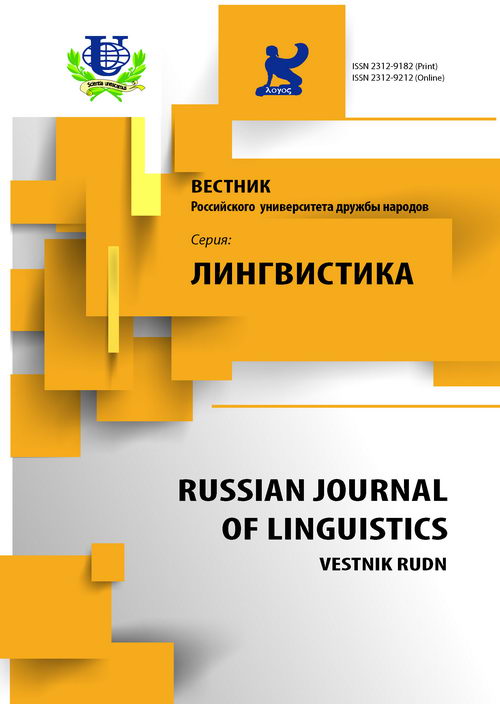No 1 (2012)
- Year: 2012
- Articles: 21
- URL: https://journals.rudn.ru/linguistics/issue/view/582
Articles
The Role of Speech Acts Theory in the Development of Linguistic Pragmatics
Abstract
In this article we consider the main concepts of speech acts theory, the stages of its development within philosophical language studies and its interaction with linguistics. The notion of a speech act has become one of the key priorities for the development of research in linguistic pragmatics. We analyse the conceptions of British, American and German scientists, who studied and developed the theory of speech acts, and those of their followers. A special focus is laid on E. Koschmieder's conception of coincidence.
Russian Journal of Linguistics. 2012;(1):5-11
 5-11
5-11


 12-24
12-24


Sense integration of thinking and speech and linking thoughts as its mediators. Part II
Abstract
The paper discusses the mediator, which is postulated by the author, known as the verbally expressed linking thought (VELT) and provides for sense integration of thought. An approach to identification of VELTs is proposed, and examples of their identification in text segments and large texts are considered. A classification of VELTs is proposed.
Russian Journal of Linguistics. 2012;(1):25-32
 25-32
25-32


 33-38
33-38


Correlation of English and Russian proverbs. Some features of bilingual translation
Abstract
This article provides a brief analysis of the national and cultural identity of English and Russian proverbs and sayings in the context of two variants of the world conceptual vision. The main task is to show some features of their translatability and transferability as the substrates of intercultural communication.
Russian Journal of Linguistics. 2012;(1):39-45
 39-45
39-45


 46-49
46-49


Stylistic qualification of words in English
Abstract
The article is devoted to stylistic qualification of English lexis, represented through the system of stylistic labels in English explanatory dictionaries. Bookish and colloquial styles are well-defined, although sphere of passage as well as their interpenetrability is not excluded. Both archaisms and regionalisms are referred to stylistic labels.
Russian Journal of Linguistics. 2012;(1):50-54
 50-54
50-54


The tradition of intertextuality in the author's tale of the material of the Italian language
Abstract
The article discussed the problem of drawing and interpretation of folklore stories by Italian authors. The tradition of intertextuality in the author's tale can be traced to ancient times and is regarded as an example of works by writers Fedro, S. Venni, C. Collodi, G. Rodari.
Russian Journal of Linguistics. 2012;(1):55-59
 55-59
55-59


Correlation of the conceptual structures of phraseological units representing love and hate
Abstract
The aim of the present article is to demonstrate the common and different characteristics proper to the Concepts «Love» and «Hate». These concepts аre opposite but while analyzing french phraseological units representing love and hate the correlation of their structures is revealed.
Russian Journal of Linguistics. 2012;(1):60-65
 60-65
60-65


Phraseological units with component-somatism in objectification of process of eating in the french culture
Abstract
In this paper, by analyzing the French phraseological units with components-somatism revealed information about national and cultural peculiarities of objectification of certain organs of the human body involved in the process of eating in the French culture.
Russian Journal of Linguistics. 2012;(1):66-69
 66-69
66-69


 70-77
70-77


Occasional actualization of idioms as the way of creation of the comic effect (on the basis of the French language)
Abstract
In the given article the author analyses the comic potential of idioms and their occasional actualizations, investigates the abilities of idioms to create an ironical tonality of the text and to have the similar influence on the addressee, studies the pragmatical mechanism of achievement of the comic effect on the basis of various types of actualization of idioms on a material of modern play J.M. Florensa «Les joyeuses et horrifiques farces du Père Lalande».
Russian Journal of Linguistics. 2012;(1):78-82
 78-82
78-82


 83-85
83-85


Analysis of mechanics of verbal manipulation with key words of social vocabulary exemplified in journalistic article
Abstract
The article deals with the analysis of mechanism of speech manipulation on readers' consciousness by means of socially marked key words, forming four concept groups: power, nation, wealth, poverty (on the material of journalistic article).
Russian Journal of Linguistics. 2012;(1):86-97
 86-97
86-97


Complex sentence in Yakut (its structural and semantic peculiarities)
Abstract
The article considers the main structural and semantic peculiarities of the complex sentences of the Sakha language which are formed, first of all, by a conjunctionless method that is caused by the postpositive-agglutinative type of structure of this language.
Russian Journal of Linguistics. 2012;(1):98-104
 98-104
98-104


The emotive category reflection in Arabic phraseological units and methods of their translation
Abstract
The article deals with one of the most relevant problems of speech - realization of the emotive category in Arabic speech and it also deals with the character of reflection of this category in Arabic phraseological units and the basic methods of their translation into Russian.
Russian Journal of Linguistics. 2012;(1):105-112
 105-112
105-112


 113-120
113-120


Election campaign discourse as a particular communication field
Abstract
The article outlines the general properties and characteristics of election campaign discourse that allow it to be distinguished as a relatively independent genre of political communication within the framework of the political discourse.
Russian Journal of Linguistics. 2012;(1):121-125
 121-125
121-125


Historical Dictionaries and Card Assembly as the Sources of Semanticisms of Slavonicisms
Abstract
In this article, we present the lexicographical description of Slavonicisms. In the examples are excerpts from these historical dictionaries and cards of the ancient/old Russian dictionary, author that reveal historical-cultural information which are enclosed in the semantics of Slavonicisms.
Russian Journal of Linguistics. 2012;(1):126-131
 126-131
126-131


 132-139
132-139


Our autHors
Russian Journal of Linguistics. 2012;(1):140-142
 140-142
140-142
















